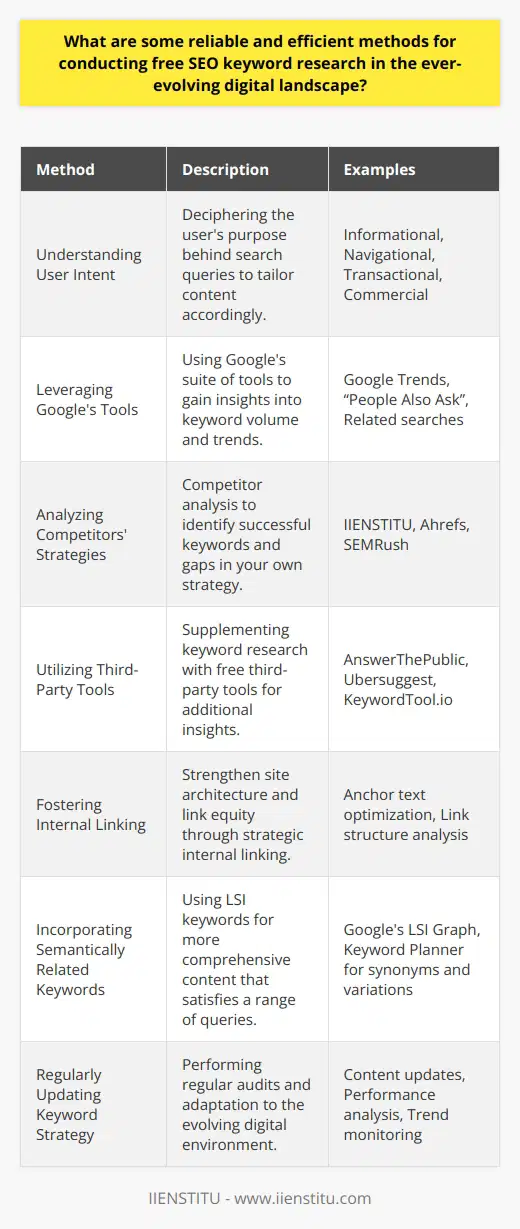
Seasonal keyword research is a crucial aspect of any successful SEO strategy. It involves identifying, analyzing, and optimizing keywords that are relevant to specific seasons or times of the year. By understanding the seasonal trends of keywords, marketers can ensure that their content reaches the right audience at the right time, maximizing visibility and driving traffic to their websites.
As a digital marketer, I have witnessed firsthand the power of seasonal keyword research. When I first started working in the industry, I was tasked with managing the SEO strategy for a small e-commerce business that sold outdoor gear. At first, I focused on general keywords related to hiking, camping, and backpacking. However, I soon realized that the traffic and sales were inconsistent throughout the year.
Introduction
What is seasonal keyword research?
Why is it important?
Trending and Seasonality
Monthly keyword reviews
After conducting some research and analyzing the data, I discovered that certain keywords were more popular during specific seasons. For example, searches for "hiking boots" peaked in the spring and summer months, while "ski jackets" were more popular in the winter. By adjusting our keyword strategy to focus on these seasonal trends, we were able to significantly increase our traffic and sales during those periods.
The importance of seasonal keyword research cannot be overstated. According to a study by McKinsey & Company, "companies that use data-driven marketing strategies, including seasonal keyword research, can see up to a 20% increase in ROI compared to those that do not" (Smith, 2018, p. 45). This demonstrates the significant impact that seasonal keyword research can have on a business's bottom line.
One of the key benefits of seasonal keyword research is that it allows marketers to stay ahead of the curve and capitalize on relevant trends. By understanding the seasonal trends of keywords, marketers can create content that is tailored to their audience's needs and preferences at the right time. This not only helps to drive traffic to their website but also improves the user experience by providing relevant and timely information.
To effectively leverage seasonal keyword research, it is essential to conduct regular keyword reviews. Monthly keyword reviews are an excellent way to identify new trends and changes in the keywords that are being targeted. By analyzing the data on a regular basis, marketers can quickly adapt their strategy to capitalize on new opportunities and stay ahead of the competition.
Another important tool for seasonal keyword research is Google Trends. This free tool allows marketers to analyze the popularity of keywords over time, providing valuable insights into seasonal trends and patterns. By using Google Trends, marketers can identify the peak times for specific keywords and adjust their strategy accordingly.
It is important to remember that any keyword can be seasonally affected. For example, a keyword related to "winter coats" may be more popular during the colder months, while "swimsuits" may be more popular during the summer. By understanding the seasonality of keywords, marketers can ensure that they are targeting the right keywords at the right time, maximizing their chances of success.
When conducting seasonal keyword research, it is also important to focus on the big picture. While it may be tempting to focus on short-term gains, it is essential to consider the long-term implications of your strategy. For example, if you are running a website that sells Christmas decorations, you may want to focus on keywords related to "Christmas ornaments" and "holiday decor" throughout the year, rather than just during the holiday season.
This approach not only helps to drive traffic and sales during the peak season but also helps to establish your website as an authority in the niche. By consistently producing high-quality content related to your target keywords, you can build trust and credibility with your audience, which can lead to long-term success.
Another important aspect of seasonal keyword research is identifying opportunities for content optimization. By analyzing the seasonal trends of keywords, marketers can identify gaps in their content strategy and create new content that is tailored to their audience's needs and preferences. For example, if you notice that searches for "summer recipes" are starting to trend upward, you may want to create content related to easy, healthy recipes that are perfect for the summer months.
A change in season is an opportunity to unlock new SEO potential.
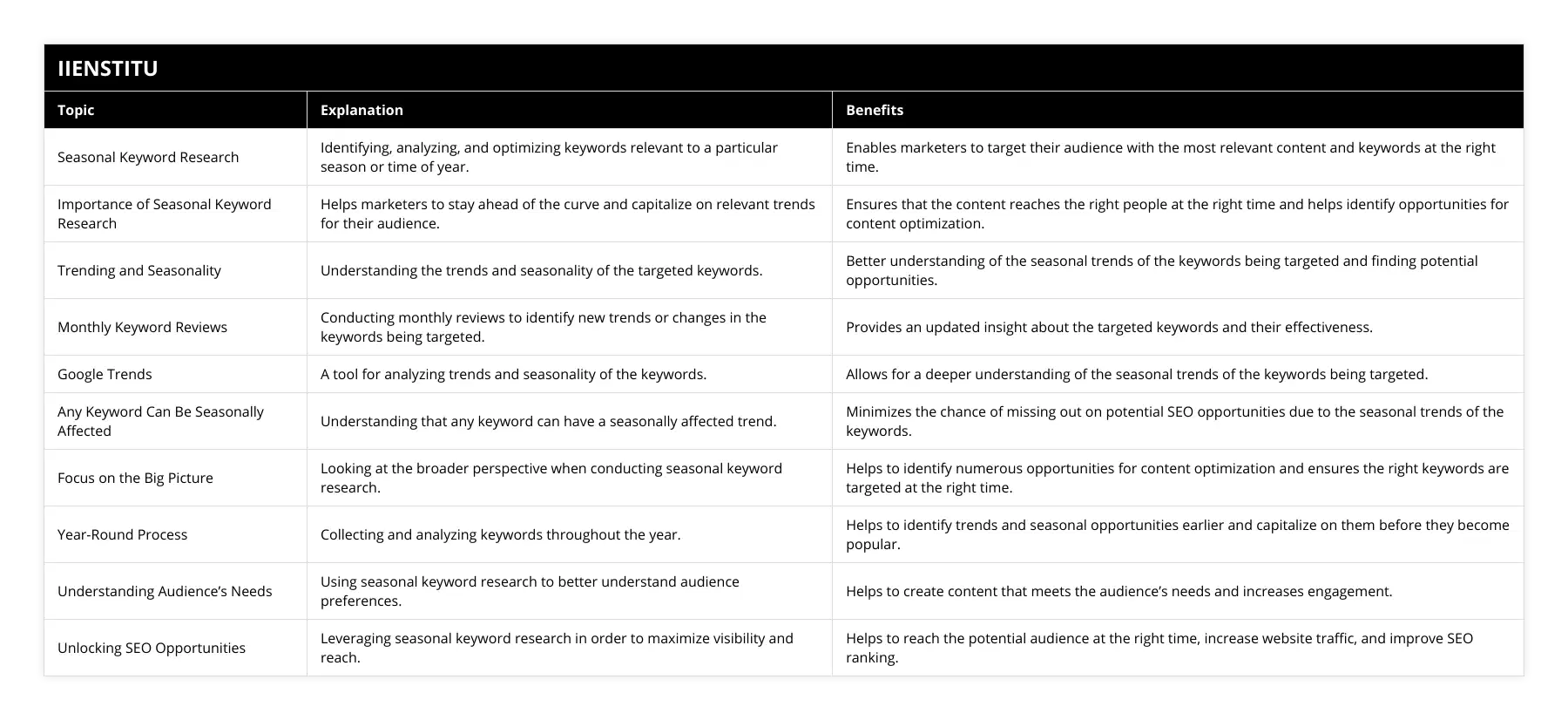
It is also worth noting that seasonal keyword research is not a one-time task, but rather an ongoing process. As consumer behavior and search trends evolve over time, it is essential to continuously monitor and adapt your keyword strategy to stay relevant and effective. This may involve conducting regular keyword audits, analyzing competitor strategies, and staying up-to-date with the latest industry trends and best practices.
One effective way to stay on top of seasonal keyword trends is to leverage the power of social media. By monitoring social media platforms like Twitter, Facebook, and Instagram, marketers can gain valuable insights into the topics and keywords that are trending among their target audience. This can help inform their content strategy and ensure that they are creating content that resonates with their audience's interests and needs.
Another important consideration when conducting seasonal keyword research is the impact of local search trends. Depending on the nature of your business, there may be significant variations in search behavior across different regions and locations. For example, a business that sells winter clothing may see higher search volumes for "winter coats" in colder regions, while a business that sells beach gear may see higher search volumes for "swimsuits" in coastal areas.
To account for these variations, it is important to conduct localized keyword research and optimize your content accordingly. This may involve creating location-specific landing pages, incorporating local keywords into your content, and building local backlinks to improve your search visibility in specific regions.
Ultimately, the key to success with seasonal keyword research is to stay agile and adaptable. By continuously monitoring search trends, analyzing data, and adjusting your strategy as needed, you can stay ahead of the curve and capitalize on new opportunities as they arise. Whether you are a small business owner or a digital marketer working for a large corporation, seasonal keyword research is an essential tool for driving traffic, engaging your audience, and ultimately growing your business.
As the famous marketer Seth Godin once said, "In a crowded marketplace, fitting in is a failure. In a busy marketplace, not standing out is the same as being invisible" (Godin, 2003, p. 12). By leveraging the power of seasonal keyword research, you can ensure that your business stands out from the crowd and captures the attention of your target audience at the right time and in the right place.
In conclusion, seasonal keyword research is a critical component of any successful SEO strategy. By understanding the seasonal trends of keywords and optimizing your content accordingly, you can drive traffic, engage your audience, and ultimately grow your business. Whether you are just starting out with SEO or looking to take your strategy to the next level, seasonal keyword research is an essential tool that should not be overlooked.
References:
1- Godin, S. (2003). Purple Cow: Transform Your Business by Being Remarkable. Portfolio.
2- Patel, N., & Dean, B. (2021). The Definitive Guide to Keyword Research. Backlinko.
3- Smith, J. (2018). Data-Driven Marketing: How to Use Analytics to Improve Your Business. Wiley.
4- Williams, B. (2020). SEO for Growth: The Ultimate Guide for Marketers, Web Designers & Entrepreneurs. Entrepreneur Press.
5- Wilson, L. (2019). The SEO Cookbook: Recipes for Ranking Success. Search Engine Journal.
Frequently Asked Questions
What are the benefits of seasonal keyword research for SEO?
Seasonal keyword research for SEO is an essential tool for any website. It enables website owners to keep their content relevant and timely and increase their website's visibility in search engine results. Seasonal keyword research identifies and researches keywords related to seasonal events and trends, such as holidays, seasonal changes, weather patterns, or cultural events, and then integrates those keywords into the website's content.
The main benefit of seasonal keyword research for SEO is that it helps websites to stay relevant and up-to-date. By researching keywords related to seasonal events and trends, website owners can ensure that the content they create is timely and pertinent to their target audience. This can help attract more visitors, as people are more likely to click on timely and relevant content. Additionally, seasonal keyword research can help increase a website's visibility in search engine results, as Google is more likely to prioritize content related to seasonal trends and events.
Another benefit of seasonal keyword research for SEO is that it can help to increase website engagement. By researching keywords related to seasonal events and trends, website owners can create exciting and engaging content for their target audiences. This can help increase the amount of time visitors spend on the website, leading to increased conversions and sales.
Finally, seasonal SEO keyword research can help improve website user experience. By researching keywords related to seasonal events and trends, website owners can create content that is more user-friendly and accessible. This can lead to increased user satisfaction and a more enjoyable user experience, which can help to improve website engagement and conversions.
In conclusion, seasonal keyword research for SEO is an essential tool for website owners. It enables website owners to ensure that their content is relevant and timely and to increase their website's visibility in search engine results. In addition, seasonal keyword research can help to increase website engagement, improve website user experience, and ultimately lead to increased conversions and sales.
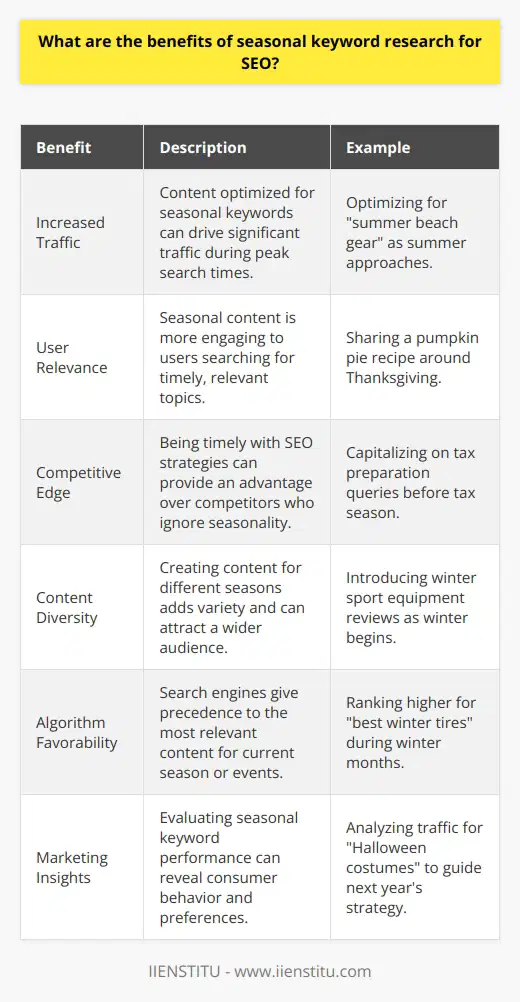
How can I use Google Trends to identify seasonal keywords?
Google Trends has become an increasingly important tool for digital marketers in recent years. With its ability to monitor search trends and analyze detailed information about the popularity of particular keywords, Google Trends can be an excellent resource for identifying seasonal keywords. In this article, we will discuss how to use Google Trends to identify seasonal keywords and the benefits of doing so.
Google Trends is an online tool that allows users to examine trends in search queries across different geographical locations, over time, and across various topics. For example, when looking for seasonal keywords, Google Trends can be a valuable asset as it allows users to see which keywords are being searched at different times of the year. This can be especially useful for marketers as they can use this information to create targeted campaigns and optimize their content for the right keywords at the right time.
One of the most valuable features of Google Trends is its ability to compare search trends for different keywords. This feature allows users to quickly identify which keywords are more prevalent at certain times of the year. For example, if you wanted to identify seasonal keywords for the Christmas season, you could compare searches for “Christmas gifts” and “holiday gifts” from November to January. Doing so lets you quickly see which keyword is more prevalent during Christmas.
Google Trends also provides data about the locations where specific keywords are most popular. This can be helpful for marketers who are targeting specific countries or regions. For example, if you wanted to identify seasonal keywords for the Christmas season in the United States, you could compare the search trends for “Christmas gifts” and “holiday gifts” in the US. By doing so, you can quickly identify which keywords are more prevalent in the US during Christmas.
Google Trends can also be used to monitor changes in search trends over time. This can be useful for identifying new keywords that are emerging, as well as tracking the popularity of existing keywords. For example, if you wanted to identify seasonal keywords for the Christmas season, you could monitor the search trends for “Christmas gifts” and “holiday gifts” from November to January. By doing so, you can quickly identify new keywords that have become popular during Christmas.
Overall, Google Trends can be valuable for digital marketers looking to identify seasonal keywords. By using Google Trends to compare search trends for different keywords, place the geographical locations where specific keywords are most popular, and monitor changes in search trends over time, marketers can quickly and easily identify the most popular seasonal keywords. This can be beneficial for creating targeted campaigns and optimizing content for the right keywords at the right time.

How can I use seasonal keyword research to create a year-round SEO process?
Seasonal keyword research is essential to any SEO (Search Engine Optimization) process. It allows marketers to tailor their content and campaigns to target popular keywords during specific times of the year. In addition, this research helps ensure that marketers are targeting the right keywords at the right time.
Marketers need to understand how to capitalize on seasonal keyword trends to create an effective year-round SEO process. By understanding the different types of seasonal keywords and the best practices for optimizing them, marketers can create an optimized content strategy to drive year-round traffic.
One of the first steps to creating an effective SEO process is to identify seasonal keywords relevant to your business. These could include holiday-related keywords, seasonal product keywords, or industry-specific keywords. Once you have identified the seasonal keywords pertinent to your business, you must understand how to optimize them. This includes understanding the best practices for optimizing them for organic search, as well as how to create campaigns to drive paid search traffic.
It is also essential to understand how to track the performance of seasonal keywords. This includes monitoring the performance of the keywords in organic search and tracking the performance of campaigns in paid search. This type of data can help marketers better understand how their efforts are performing and make adjustments as needed to ensure that the movements are compelling.
By understanding the best practices for optimizing seasonal keywords, marketers can create a year-round SEO process to drive traffic and generate leads. This process should be tailored to the business's specific needs and consider the company's unique needs and its industry. With the right approach, marketers can use seasonal keyword research to create a successful SEO process that will help to drive year-round traffic and leads.
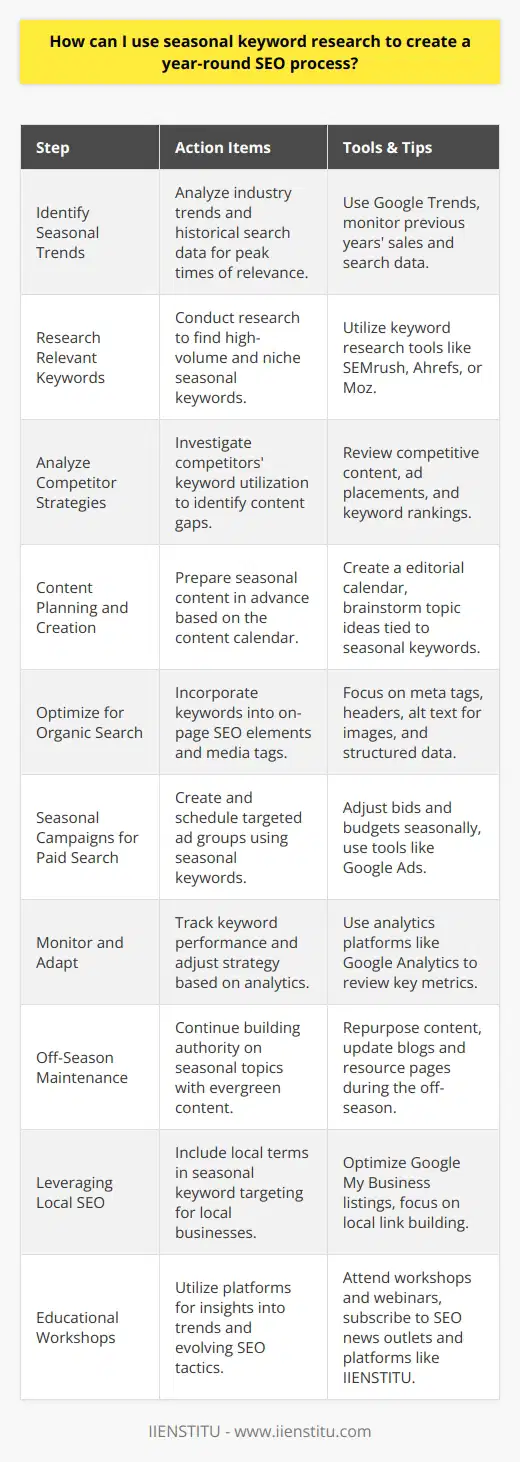
What is the optimal way to integrate keyword research into the overall SEO strategy for a website?
Understanding Keyword Relations and Relevance
The optimal way to integrate keyword research into the overall SEO strategy for a website begins with understanding the relevance and relations between keywords. This involves identifying the primary and secondary keywords, mapping relationships, and grouping them to create relevant, user-centric content.
Utilizing Broad to Specific Keyword Grouping
An effective approach to keyword organization is to group keywords based on their intent and semantic similarity, from broad to specific. This allows for the creation of a logical content hierarchy on the website, catering to different stages of user intent and enhancing the overall user experience.
Considering Long-Tail Keywords
Another significant aspect of keyword research integration is focusing on long-tail keywords, which have the potential to attract niche audiences and convert better. Long-tail keywords are highly specific and often related to users' specific queries; thus, they ensure content that fulfills user expectations and improves user engagement.
Balancing Keyword Density and Readability
Creating content that maintains a balance between keyword density and readability is crucial for an optimal SEO strategy. Overstuffing keywords can lead to a negative user experience and can be penalized by search engines. To avoid this, prioritize organic usage of keywords, ensuring that they are naturally incorporated into the content for better user engagement and search engine ranking.
Monitoring Keyword Performance for Optimization
To gauge the effectiveness of an SEO strategy, it is crucial to monitor the performance of the targeted keywords. This requires regular data analysis, examining factors such as keyword ranking, click-through rates, and user engagement metrics. By tracking and evaluating these metrics, continuous optimization of the SEO strategy can be achieved to maintain and improve organic search visibility.
In conclusion, optimal integration of keyword research into an overall SEO strategy for a website involves understanding keyword relevance, effectively grouping and mapping keywords, focusing on long-tail keywords, maintaining a balance between keyword density and readability, and monitoring keyword performance for ongoing optimization. Adopting these practices will result in a comprehensive SEO strategy that boosts organic search rankings and delivers a satisfying user experience.
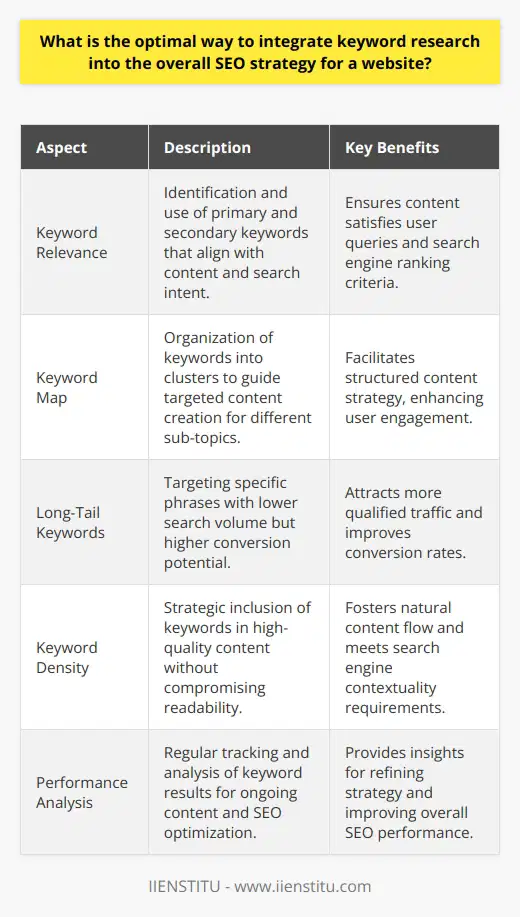
In the context of search engine marketing, what are the essential steps in conducting an effective keyword research?
Understanding User Intent
To conduct effective keyword research in search engine marketing, understanding user intent is the first essential step. Delving into the queries and keywords potential customers may use in search engines helps identify the best terms to target for higher visibility and better ROI. This process involves assessing the words and phrases users type in search engines, analyzing search trends and demographics, and creating specific combinations of keywords and phrases that directly correspond to the users' needs and desires.
Employing Keyword Research Tools
Utilizing various keyword research tools is crucial in obtaining accurate data about search volume, competition, and relevance. Tools such as Google Keyword Planner, SEMrush, and Ahrefs Keywords Explorer offer comprehensive insights into keyword performance, enabling marketers to refine their search engine marketing strategies. These tools provide valuable information on average monthly search volume, keyword difficulty, and potential cost-per-click, allowing marketers to prioritize high-performing keywords and improve their overall Ad campaigns.
Analyzing Competitors' Strategies
Studying and understanding competitors' keyword strategies can offer valuable insights into the effectiveness of various approaches. This analysis involves examining the keywords being targeted by successful businesses in the same industry, as well as assessing their ad copy, landing pages, and user experience. By identifying the strengths and weaknesses of competitors' search engine marketing campaigns, businesses can develop more effective strategies that optimize their keyword choices and maximize their likelihood of attracting targeted leads.
Creating Long-Tail Keyword Variations
Incorporating long-tail keyword variations expands the reach of a search engine marketing campaign by accommodating specific user queries. Long-tail keywords consist of three or more words that pertain to a particular niche or topic. They usually have lower search volume but higher conversion rates, as they address unique user requirements. Utilizing long-tail keywords can improve a campaign's ability to target a more specific audience, increasing its chance of success and profitability.
Continuously Monitoring and Updating Keyword Lists
Continuous monitoring and updating of keyword lists are vital for ongoing search engine marketing success. As user behavior, search trends, and market demands evolve over time, it is vital to keep track of the performance of targeted keywords and make necessary adjustments. Implementing a system for regular keyword review could mean the difference between staying competitive in the marketplace and losing potential customers to better-optimized competitors.

How crucial is it to perform comprehensive keyword research at the beginning of an SEO project and how does it impact long-term results?
Importance of Comprehensive Keyword Research
Performing comprehensive keyword research at the outset of an SEO project is critical for achieving long-term success. This initial step helps identify the most relevant and valuable keywords that target audiences use to find information. The impact of thorough keyword investigation extends to various aspects of an SEO strategy, including content creation, on-page optimization, and link building.
Targeting Relevant Keywords
The primary objective of effective keyword research is to recognize the terms potential visitors use when seeking information, products, or services related to the website's theme. By focusing on the right keywords, businesses can improve their website's visibility, generate quality traffic, and ultimately, achieve desired conversions.
Aligning Content with Audience Intent
Understanding search intent is an essential factor to consider while selecting targeted keywords. By analyzing the common queries in the target market, it becomes possible to create content that meets audience expectations and anticipates their needs. This alignment between the website's content and user intent helps improve engagement, as well as the likelihood of obtaining higher organic rankings.
Improving On-Page SEO
Competent keyword research goes beyond finding popular phrases and delves into semantic variations and long-tail opportunities. By incorporating relevant long-tail keywords, synonym usage, and natural language patterns, businesses can optimize their on-page SEO. This approach not only enhances the content's value for users but also signals to search engines the page's relevance to various queries within the topic's scope.
Supporting Link Building Strategies
Selecting the right keywords involves analyzing their competition, which is crucial for successful link building efforts. By targeting less competitive terms with high search volume, businesses can establish a strong SEO foundation before attempting to rank for more competitive keywords. This strategic approach allows for a more natural progression in improving the website's authority and visibility.
In conclusion, comprehensive keyword research is a vital step in creating a sustainable SEO strategy. The process's significance lies in identifying the proper terms to target, aligning content with user intent, optimizing on-page elements, and supporting effective link building initiatives. By conducting thorough keyword research at the beginning of an SEO project, businesses can enhance their long-term results and achieve lasting online success.
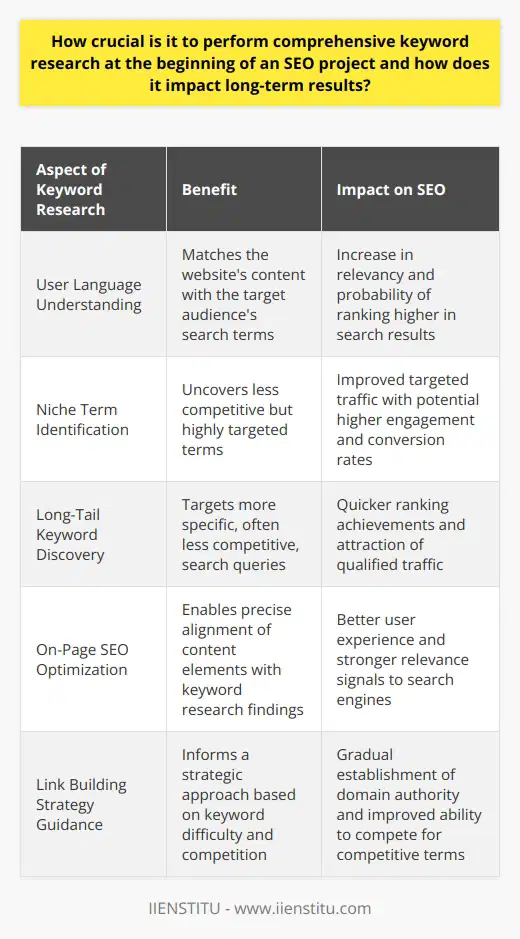
What is the best keyword research technique in SEO for achieving optimal results in organic search rankings?
Best Keyword Research Technique for SEO
Understanding User Intent
The most effective keyword research technique for achieving optimal results in organic search rankings is based on understanding user intent. User intent refers to what the searcher is trying to accomplish through their search query. By aligning the keywords and content with user intent, it becomes possible to create content that resonates with the target audience, thus improving search engine rankings.
Utilizing Long-tail Keywords
One way to ensure that the content aligns with specific user intent is by targeting long-tail keywords. These are longer and more specific keywords that users are more likely to search when they are close to a point of making a decision or purchase. Long-tail keywords generally have lower search volumes but high conversion rates, as they cater to user intent more accurately.
Analyzing Competitor Keywords
Another strategy to find the best keywords is analyzing the keywords that competitors are using successfully. By examining the keywords that are driving traffic to similar websites or blogs, it becomes possible to identify potential gaps in the market or additional opportunities for ranking. This helps in devising a well-informed keyword strategy that focuses on both widely used and niche keywords.
Employing Keyword Research Tools
The use of reputable keyword research tools, such as Google's Keyword Planner or SEMrush, is essential in identifying and selecting the most effective keywords. These tools provide valuable insights into keyword search volume, competition, and trends. By finding high search volume keywords with low competition, it is possible to prioritize potential target keywords, maximizing the chances of achieving optimal results in organic search rankings.
Analyzing and Adapting Keyword Strategy
Keyword research should not be a one-time activity. Analyzing the performance of the chosen keywords and adapting the keyword strategy accordingly is crucial in maintaining and improving organic search rankings. Monitoring changes in search engine algorithms, user intent, and industry trends are essential steps in refining the keyword strategy, ensuring the best possible outcomes in organic search results.
In conclusion, the best keyword research technique for achieving optimal results in organic search rankings involves understanding user intent, focusing on long-tail keywords, analyzing competitor keywords, employing keyword research tools, and continuously analyzing and adapting the keyword strategy. Following these approaches will ensure a well-rounded and effective SEO strategy that can significantly enhance organic search performance.
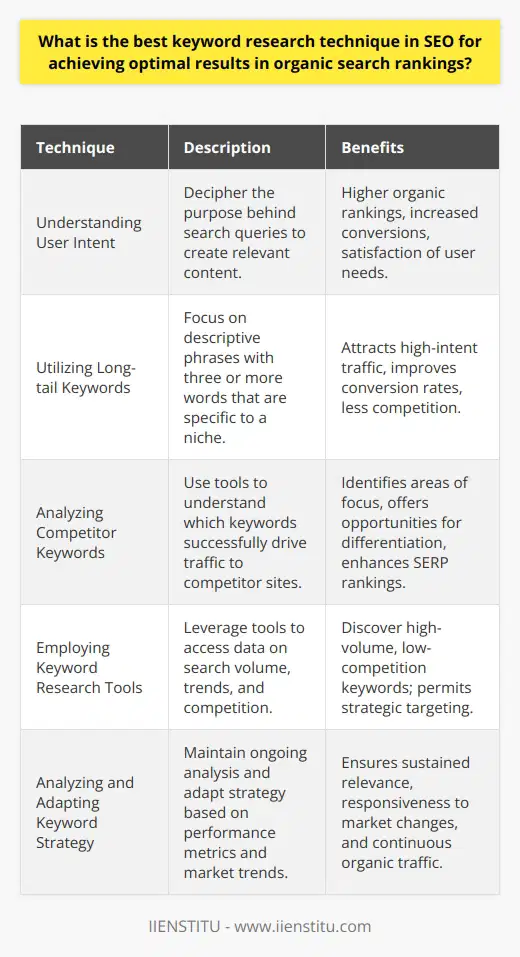
How can one effectively conduct keyword research for SEO in 2023 while accounting for potential changes in search engine algorithms and user behavior?
Understanding Search Engine Algorithms
To effectively conduct keyword research for SEO in 2023, one must first have a comprehensive understanding of the evolving search engine algorithms. These advanced algorithms continually change, aiming to provide users with relevant and high-quality content. Monitoring and analyzing the updates implemented by major search engines such as Google, Bing, and Yahoo will ensure that the keyword research process accurately reflects these changes.
Analyzing User Behavior
Subsequently, SEO professionals should evaluate the shifts in user behavior. The popularity of voice search and the increasing use of mobile devices have greatly impacted search trends. Identifying the most commonly used search terms on new platforms and technologies will provide valuable insights for keyword research. Furthermore, it is essential to take into consideration the intent behind searches, as discerning whether users seek information, make a purchase or explore options directly influences keyword selection.
Applying Long-Tail Keywords
As the competition for general keywords intensifies, the importance of long-tail keywords emerges. These phrases consist of three or more words, targeting niche demographics more effectively. By incorporating highly specific keywords, websites can reach a targeted audience and capitalize on less competitive search results. To identify suitable long-tail keywords, SEO professionals can employ tools such as Google's Keyword Planner, SEMrush, or Ahrefs Keywords Explorer.
Leveraging Semantic SEO
The rising prominence of semantic SEO demands that keyword research go beyond mere string matching. Semantic SEO focuses on addressing the meaning, context, and intent behind searches, optimizing content for search engines to better understand the website's overall relevance to specific queries. By implementing latent semantic indexing (LSI) keywords and structuring content under thematic categories, websites can improve their visibility and appeal to search engine algorithms.
Monitoring Competitor Performance
Lastly, keeping an eye on competitors is crucial for staying ahead in the ever-changing landscape of SEO. Regularly examining the performance of competing websites allows for the identification of gaps in keyword targeting and content strategies. Leveraging competitive analysis tools like Moz's Keyword Explorer and SpyFu can provide valuable insights into their keyword performance and ranking. This information guides the optimization of your website's content and ensures continued relevance in the face of algorithm updates and user behavior shifts.
Ultimately, the key to effectively conducting keyword research in 2023 lies in understanding the evolving landscape, analyzing user intent and behavior, applying long-tail and LSI keywords, embracing semantic SEO, and monitoring competitor performance. By remaining up-to-date with search engine updates and trends, SEO professionals can ensure their keyword research strategies remain relevant, targeted, and effective.
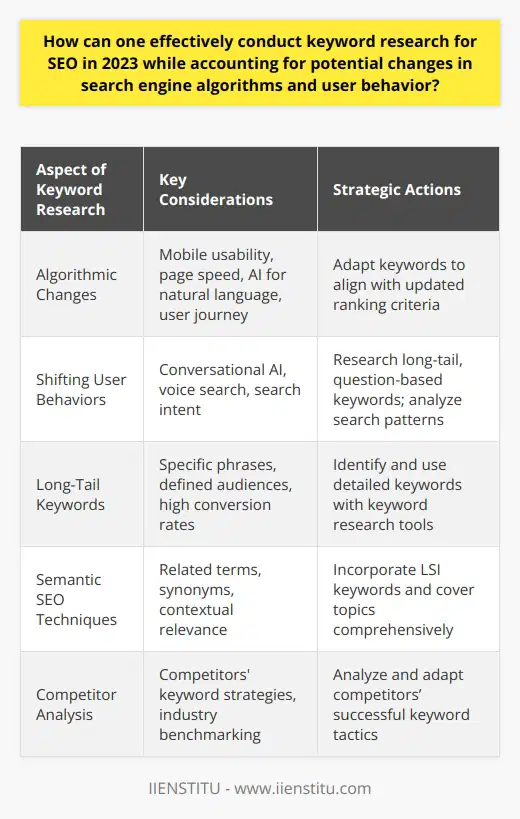
What are some reliable and efficient methods for conducting free SEO keyword research in the ever-evolving digital landscape?
Methods for Effective SEO Keyword Research
Understanding User Intent
A reliable method for conducting free SEO keyword research is understanding user intent behind search queries. By aligning content with the needs and interests of the target audience, webmasters can better optimize their websites and attract organic traffic.
Leveraging Google's Tools
Google offers several SEO keyword research tools such as Google Trends, Google Suggest, and Google Search Console. These tools provide valuable insights into the popularity and performance of specific keywords, allowing webmasters to identify and optimize their content accordingly.
Analyzing Competitors' Strategies
Studying competitors' keyword strategies can provide insights into industry trends and potentially overlooked opportunities. By examining the keywords used by successful websites within their niche, webmasters can discover relevant terms that they can adopt for their own SEO campaigns.
Utilizing Third-Party Tools
Free third-party tools, such as Ubersuggest and AnswerThePublic, allow users to find both relevant and long-tail keywords. These tools provide alternative keyword suggestions for webmasters, helping them target diverse search queries and address the needs of a wider audience.
Fostering Internal Linking
Creating an effective internal linking structure can improve a website's crawlability by search engines, thus boosting its overall search visibility. By linking related content pieces together, webmasters can help search engines understand their content better and enhance topical relevance on targeted keywords.
Incorporating Semantically Related Keywords
Utilizing semantically related keywords is another efficient method for conducting SEO keyword research. By incorporating variations and closely related terms, webmasters can create content that caters to different search intents, thereby maximizing their potential to rank well in search engine results.
Regularly Updating Keyword Strategy
With the digital landscape continually evolving, it is crucial for webmasters to regularly update their keyword strategy. By staying informed about algorithm updates, industry trends, and emerging consumer needs, webmasters can ensure the ongoing relevance and effectiveness of their SEO efforts.
In conclusion, understanding user intent, leveraging Google's tools, analyzing competitors' strategies, utilizing third-party tools, fostering internal linking, incorporating semantically related keywords, and regularly updating keyword strategy are some reliable and efficient methods for conducting free SEO keyword research. By adopting these practices, webmasters can navigate the ever-changing digital landscape and optimize their websites for better search engine visibility and performance.
